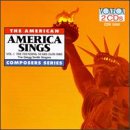| All Artists: John Antes, Daniel Belknap, William Billings, Oliver Brownson, Jeremiah Dencke, Peter van Sr. Hagen, Bernard Herrmann, Francis Hopkinson, Jeremiah Ingalls, Gregg Smith Singers Title: America Sings 1 Members Wishing: 0 Total Copies: 0 Label: Vox (Classical) Release Date: 4/16/1995 Genres: Special Interest, Classical Styles: Opera & Classical Vocal, Historical Periods, Baroque (c.1600-1750), Classical (c.1770-1830), Symphonies Number of Discs: 2 SwapaCD Credits: 2 UPC: 047163508028 |
Search - John Antes, Daniel Belknap, William Billings :: America Sings 1
 | John Antes, Daniel Belknap, William Billings America Sings 1 Genres: Special Interest, Classical
|
Larger Image |
CD Details |
CD ReviewsThey just don't get it Porter | Los Angeles, CA | 12/10/2007 (2 out of 5 stars) "Wow, okay, to be fair, I haven't listened to every track on this album. But that is because I had to turn it off - I couldn't take much more. Simply, this is just the wrong kind of music to be sung by "classical" voices. As a rule, it sounds terrible, unnatural and disingenuous. They have lovely voices, but they need to stick to true "choral" arrangements, which these are not. Their voices are too trained; too much technique is involved and as a result, the power of this raw music is lost. There have been numerous re-vampings of shapenote and early-American psalms which have been masterful, from choral/baroque styles to punk/rock/pop. This is not one of them. Frankly, anyone putting together an early-american/shapenote album should know better than to try to class-up this music. It makes me think that they simply just don't know the material, history and tradition. Or worse yet, they do know it but feel in order to give the music true value they needed to repackage it for a more delicate ear. The most pardonable reason would be that it was an experiment which simply went bad. Whatever the case may be, this album just doesn't work." A voice teacher and early music fan George Peabody | Planet Earth | 02/11/2010 (5 out of 5 stars) "SUPERB SINGING THAT ENABLES THE LISTENER TO HEAR THIS MUSIC OF THE EARLY AMERICAN COMPOSERS AT ITS BEST!
It is very important that the potential listener understand that firstly this is Volume One in the American Series (Seven volulmes) that deals with the COMPOSERS of The Founding Years. The emphasis is not on the singers producing the sounds. Seondly, as the years moved on in the development of the singing sound it became more pleasant and less 'authentic'. But, frankly ,when I purchase a historically oriented recording such as this one for my own personal listening pleasure, I don't want to hear the rough 'chesty' singing of the folksy kind, for lack of a better word. However, if I am teaching an early American music history course, I certainly would want the less 'refined ' sound. But, to each his own. This 2 CD package has excellent liner notes that go into much detail about the song material, its history and the composers involved; one has only to read it! This volume of American vocal music is the first of a series that presents the rich heritage of American vocal music from the time of the first European settlements in the early seventeenth century to the present. Although instrumental music has dominated the American classical music scene through most of our century, it is vocal music that dominates the total historical picture of American music. In choosing the literature for this first set Gregg Smith has tried to cover as broad a chronological range as possible. A great deal of emphasis is on New England. That is not only because of the concentration of population and activity in the area, but because researh efforts in other parts of the country have been considerably limited to date. Because so much of early American life was centered around religion, it is inevitable that the music presented here is primarily religious. In fact, if there ever was a quantity of secular music in the early pre-revolutionary years, the preservation of such music is almost nil. CD One begins with 21 short cuts of PRE-REVOLUTIONARY WAR MUSIC from the Ainsworth and Bay Psalters, anthems such as 'Oxford Tune', 'York Tune' and 'Old Hundredth'; Solos, Unison singing in groups, and Harmony (4 part). All unaccompanied. SACRED MUSIC OF THE REVOLUTIONARY PERIOD, such as 'Canon, Thus saith the high the lofty one'; Anthem 'Behold I Bring You glad tidings' and Anthem 'O be joyful in the LOrd'. solo, 2, 3 and 4 -part harmony. Then follows EIGHT SONGS FOR SOLO VOICE AND KEYBOARD(HARPSICHORD) of Francis Hopkinson. Some of these are: 'Come Fair Rosina', 'My Love is gone to Sea', and 'O'er the hills and far away'. CD 2 features music from 18TH CENTURY AMERICAN TUNE BOOKS, like 'The Lord Desecended From Above', '19th Psalm' and 'Isle of Wight'. MUSIC OF THE AMERICAN MORAVIANS includes songs such as:'O,Be Glad, Ye Daughters of His people', 'God was in Jesus' and 'How Beautiful upon the mountains. The final category is SECULAR MUSIC OF THE AMERICAN REVOLUTION with songs like: 'Bunker Hill', 'Friendship' and 'The Seasons'. For the most part the music on CD 2 makes us3 of a light orchestral accompaniment. There is so much information to be gleaned from the notes accompanying these two CD's, BUT having said this, I must say that the performance of the Gregg Smith Singers makes it easy to simply enjoy the music for music's sake. This small ensemble based in New York City is notable for not only its Early Music skills and knowledge, but also 20th century music. I have heard this group 'live' in concert. They simply take your breath away, with the enthusiasm, and superb vocal skills that involve ABSOLUTELY PERFECT DICTION. Their sound is glorious and both soloists and combinations on this recording is incredibly pleasurable, that is if you are an early music lover!" |

 Track Listings (35) - Disc #1
Track Listings (35) - Disc #1